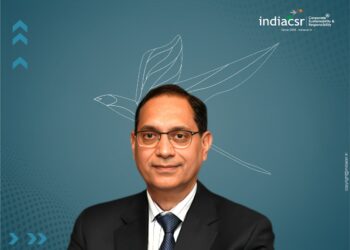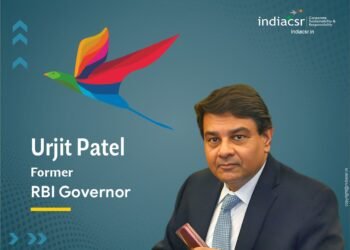From May 2019 onwards, billionaire Sanjiv Goenka has funneled Rs 664 crore towards political contributions.
MUMBAI (India CSR): Haldia Energy Limited, a power generation company controlled by billionaire Sanjiv Goenka, has made a significant purchase of electoral bonds worth Rs. 377 crore. The company operates a 600-MW power plant at Haldia in West Bengal and is a wholly-owned unit of CESC, which distributes power in Kolkata and other parts of West Bengal.
Since May 2019, billionaire Sanjiv Goenka has directed Rs 664 crore into political funding. His Kolkata-based conglomerate, the RP Sanjiv Goenka Group, channeled Rs 564 crore of this sum via electoral bonds. These bonds were bought by five companies within his business empire. An additional Rs 100 crore was donated through an electoral trust.
In response to a Supreme Court order, India’s Election Commission just released a bunch of details about electoral bonds on their website. This info comes straight from the State Bank of India (SBI). The data blows the lid on some big-name buyers of these bonds, including famous business leaders like Lakshmi Mittal (steel industry), Sunil Mittal (Airtel), Sanjeev Goenka (RP-Sanjiv Goenka Group), and companies like Vedanta, ITC, and Mahindra & Mahindra.
Even more surprising, a little-known company called Future Gaming and Hotel Services, which is being investigated by the government, bought a whopping Rs 1,350 crore worth of electoral bonds! This raises some eyebrows.
For comparison, here are some other big spenders:
- Vedanta Ltd, owned by Anil Agarwal, bought Rs 398 crore in bonds.
- Companies owned by Sunil Mittal (including Airtel) purchased a total of Rs 246 crore.
- Steel giant Lakshmi Mittal himself bought Rs 35 crore worth of bonds.
- Megha Engineering, a Hyderabad-based infrastructure company, snapped up Rs 966 crore in bonds.
A Power Move by the RP-Sanjiv Goenka Group
Financial Performance
In the fiscal year 2022-23, Haldia Energy reported a profit of Rs. 261 crore on a turnover of Rs. 1,948 crore. In the same fiscal, its parent company, CESC, reported a profit of Rs. 830 crore on a revenue of Rs. 8,150 crore.
The RP-Sanjiv Goenka Group
The RP-Sanjiv Goenka Group was created in 2010-11 after veteran industrialist RP Goenka split his businesses between his elder son Harsh and younger son Sanjiv. Sanjiv Goenka, the chairman of the group, has risen to fame as a politically savvy industrialist. He also owns the IPL cricket team Lucknow Super Giants and the Mohun Bagan football team.
Diversified Business Interests
The Kolkata-based conglomerate has a growing presence in several businesses including media, sports, carbon black, IT-enabled services, consumer and retail. In 2020-21, it earned a revenue of more than Rs. 26,000 crore. PCBL, one of the group companies, is India’s largest carbon black manufacturer and a key exporter. The group is also engaged in producing tea, rubber, and spices.
Future Prospects
The group is evaluating opportunities in solar, wind, and hydropower. It also operates multi-format retailer Spencer’s, IT-enabled service provider First Source, and music label Saregama. With its diverse portfolio and strategic investments, the RP-Sanjiv Goenka Group continues to make its mark in the Indian business landscape.
***
The Anonymity Shield
Electoral bonds offer a veil of anonymity to donors, purportedly to protect them from political victimization. However, this anonymity also obscures the sources of political funding from the public eye, raising concerns about the potential for undisclosed corporate influence on policy-making.
When companies like Haldia Energy invest significant sums into political parties via these bonds, it prompts questions about the nature of the returns they expect and the potential for such contributions to sway governance decisions in favor of corporate interests.
***
Corporate Giants in the Political Arena
The engagement of major corporations and prominent business figures in the electoral bonds scheme highlights a worrying trend of financial muscle flexing in political corridors.
Entities such as Vedanta, Airtel, and Haldia Energy, led by influential moguls, channel large amounts of money into the political system, underscoring a power imbalance. This financial clout risks overshadowing the democratic principle that all citizens, irrespective of their economic standing, should have an equal influence on political developments.
***
The Case of Future Gaming and Hotel Services
An even more alarming scenario is presented by the involvement of companies under investigation, such as Future Gaming and Hotel Services, which purchased electoral bonds worth a staggering Rs 1,350 crore. Such instances highlight the potential misuse of electoral bonds as a mechanism for laundering reputations and funds, undermining the integrity of political financing and shaking public faith in the electoral and governance systems.
***
Competitive Political Patronage
The disparity in the amounts invested in electoral bonds by various companies lays bare a landscape of competitive political patronage. This competition, driven by the financial capabilities of corporations, threatens to drown out the voices of the less financially endowed and skew policy-making in favor of those with the deepest pockets. It raises a fundamental question about the integrity of democratic processes and the equitable representation of interests within a society.
***
The Dilemma of Diversified Conglomerates
The involvement of diversified conglomerates like the RP-Sanjiv Goenka Group in significant electoral bond purchases brings to light the potential conflicts of interest inherent in such transactions.
With business interests spanning multiple sectors, these groups stand to benefit from favorable policies and contracts, suggesting that their financial contributions might be aimed at securing a competitive edge through political influence, rather than supporting democratic principles and governance.
The integrity of the democratic process is under scrutiny. The anonymity and substantial financial flow through electoral bonds may obscure the source of political funding, complicating the fight against corruption and money laundering.
Also Read
copyright@indiacsr.in























